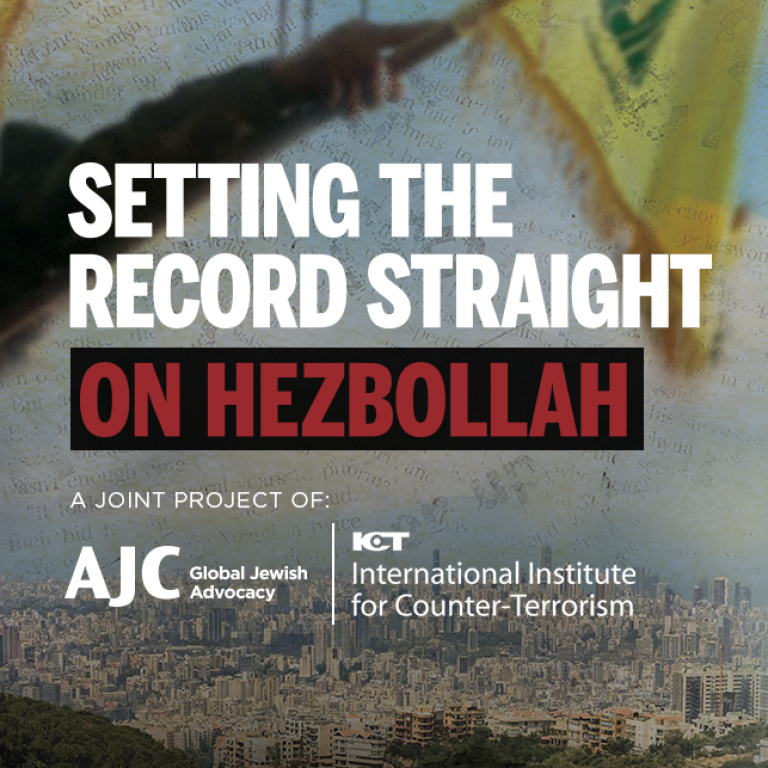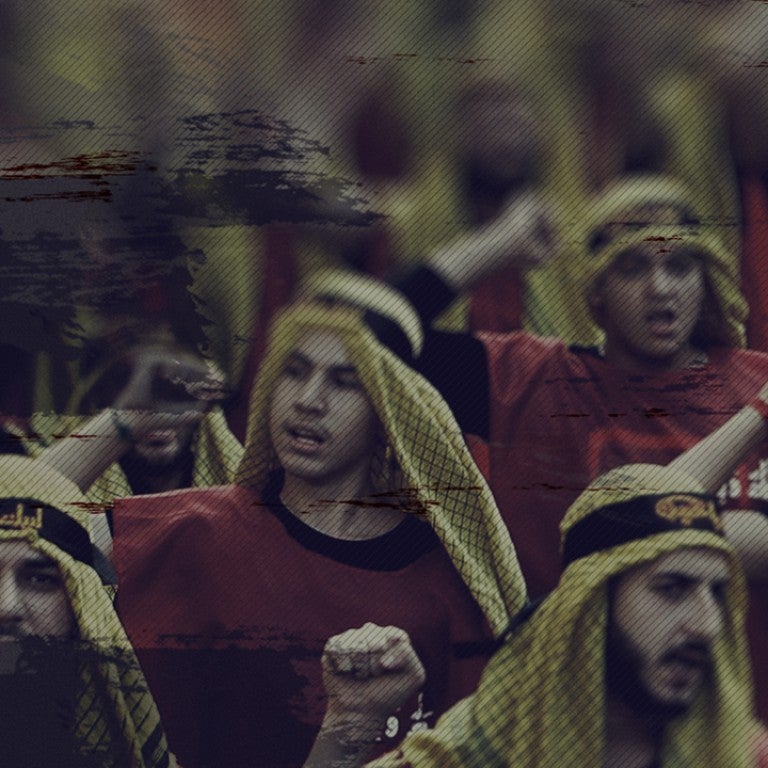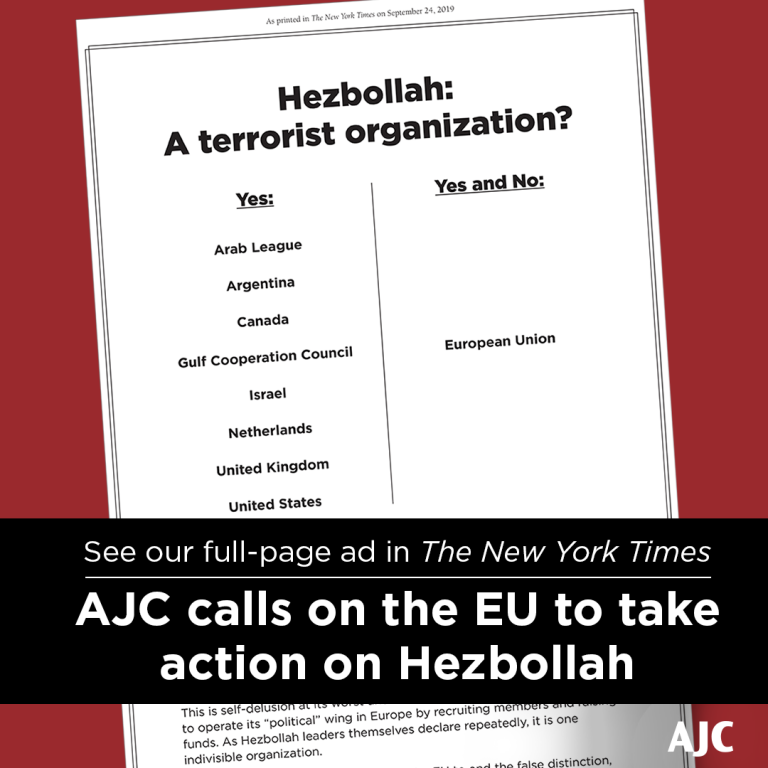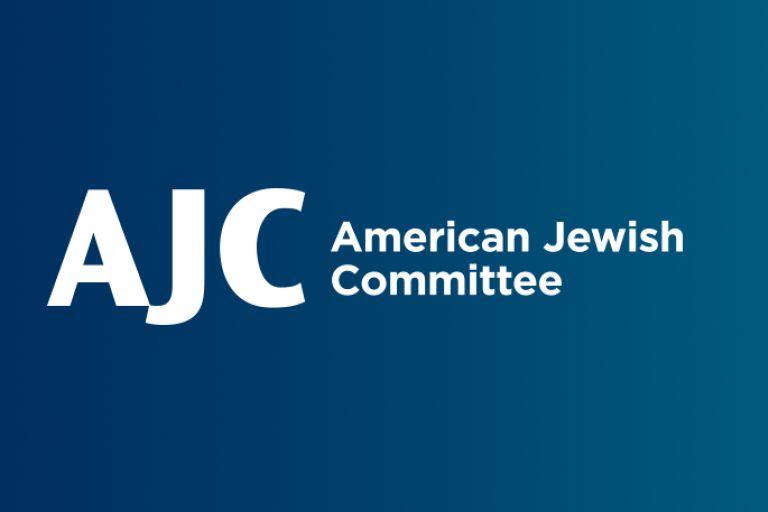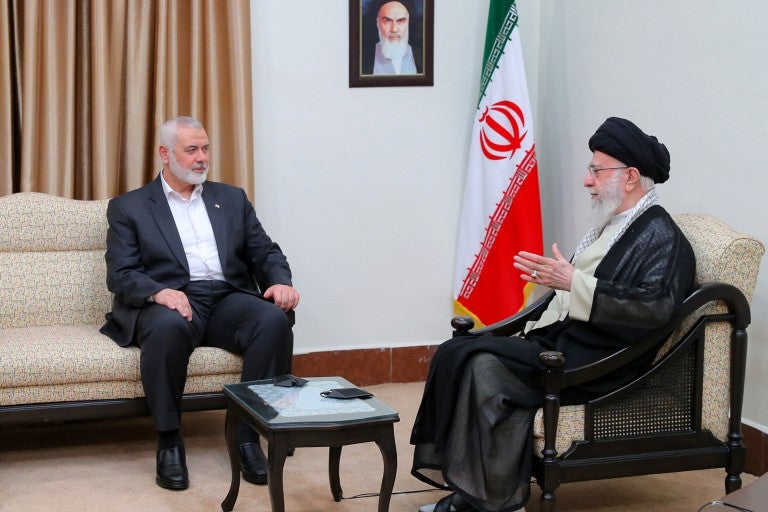“The effort to combat antisemitism in Europe and Hezbollah are two different things.”
Short Response: Hezbollah has adopted the anti-Zionist rhetoric of modern-day antisemitism.
The Facts: Hezbollah was established on the ideology of antisemitism. Its founding principles are rooted in the hatred of Jews, the elimination of a Jewish state, and the determination to deny Jews their right of self-determination or nationhood. Hezbollah knows that more Jewish blood has been spilled in Europe than anywhere else, which makes the continent a fertile breeding ground to fulfill its mission.
However, Hezbollah has learned to manipulate the guilt complex that permeates certain European countries whose Jewish communities were decimated during the Holocaust. Thus, its rhetoric is framed as anti-Zionist rather than antisemitic. They overstate the oppression of the Palestinians that they say is perpetuated by Israeli policies, then use that fiction to justify delegitimizing a Jewish state.
As long as Europe allows any manifestation of antisemitism, regardless of the rhetoric (i.e. “old school” or under the anti-Zionist cover), Europe is complicit in the violation of human rights within its borders. To stop this rising antisemitic tide, Europe has the moral and legal obligation to halt all of Hezbollah’s activities within its jurisdiction.
General Overview:
Antisemitism – In November 2018 the European Union Agency for Fundamental Rights (“FRA”) published a report about antisemitism. The report said that antisemitism may be manifested in various forms, including verbal and physical abuse, threats, harassment, discrimination and unfair treatment, property damage and bodily injury, graffiti, other forms of expression as well as on the web. Antisemitic incidents, which are in fact hate crimes, violate basic human rights, including liberty, human dignity, and the right for freedom of thought, conscience, and religion provided to all people in Europe under ECHR. Wherever Hezbollah sets up shop, its goal is to carry out hate crimes against Jewish and Israeli targets around the world in the form of terrorist attacks.
The International Holocaust Remembrance Alliance defines antisemitism as “a certain perception of Jews, which may be expressed as hatred toward Jews. Rhetorical and physical manifestations of antisemitism are directed toward Jewish or non-Jewish individuals and/or their property, toward Jewish community institutions and religious facilities. Manifestations might include the targeting of the state of Israel, conceived as a Jewish collectivity.”
Any European nation that has agreed to uphold the European Convention on Human Rights (“ECHR”) and/or has adopted the IHRA definition of antisemitism cannot intellectually defend the political or social welfare wing of Hezbollah as legitimate. Doing so allows Hezbollah to become respectable contributors to the mainstream discourse rather than antisemites, but simultaneously informs a rising tide of anti-Jewish hatred.
Antisemitic Trends in Europe
In recent years, antisemitism has been on a steep rise in Europe. For example:
- The Guardian (British newspaper) reported in February 2019 that France has seen an increase of 74% of attacks against Jews in the previous year and Germany has seen a 60% increase of violent antisemitic attacks.
- Haaretz (Israeli newspaper) reported at the end of May 2019 that Chancellor Angela Merkel called for police protection at all Jewish institutions in the face of rising antisemitism in Germany.
- According to a December 2018 survey of Jews across Europe conducted by the EU Agency for Fundamental Rights (FRA), 89% of European Jews say antisemitism has increased in their country over past five years.
- A CNN (American TV news network) survey about antisemitism in Europe from September 2018 found that 28% of the participants believed Jews had too much influence within the business and financial sectors globally. The survey included over 7,000 people and one out of five of them responded that antisemitism is a reaction to the everyday behavior of the Jewish people.
- Politico (American news outlet) published in April 2019 that antisemitism in Europe is at a five-year high.
Hezbollah’s Antisemitic Rhetoric
Hezbollah aims to eliminate the State of Israel and cultivate hatred against the Jewish people through antisemitic incitement.
- In a 2002 speech, Hezbollah’s leader Hassan Nasrallah said that all the Jews are banded together in Israel, making it possible to fight them when they are grouped together and saving the trouble of chasing them around the world.
- In another speech, aired on Al-Manar TV in 2010, Nasrallah openly and publicly denied the Holocaust. The IHRA working definition lists Holocaust Holocaust denial as an example of antisemitism.
- Naim Qassem, Hezbollah’s second in command, once said history proved that, regardless of the Zionist question, Jews are people with evil ideas.
- Nabih Berri, the Lebanese parliament speaker and the leader of the pro-Hezbollah movement Amal, made an anti-Jewish remark in an interview he gave in June 2019 to Al-Joumhouria. Berri said that, in order to identify a Jew, one has to throw a piece of gold at the feet of a pregnant woman. If the fetus jumps out of her womb to pick it up, he said, then it is a Jew.
- Celebrating Al Quds Day around the world and particularly in Europe constitutes another antisemitic manifestation. A recent march in Germany, where antisemitism is on the rise, saw some 1,000 attendees, including Hezbollah operatives calling for Israel’s destruction. One need only see the Stars of David engulfed in flames and hear the death chants to understand this has less to do with Israel and more to do with a deep-seated demonization of the Jewish people.
Anti-Zionist Rhetoric (Antisemitism 2.0) –Demonization of Jews and Israel has undeniably reached new heights. This phenomenon is partly due to the rise of fanatical fundamentalist Islam and its blatant refusal to accept the Jewish right to self-determination, coupled with the exercise of Jewish sovereignty in an area perceived by them as purely Muslim. In the Arab world the term Jew (Yahud) is interchangeable with Zionist (Sahyuniyyun) or Israeli. In his research, the late holocaust scholar Robert S. Wistrich demonstrated that the radical antisemitic narrative has camouflaged itself as anti-Zionism much more since the turn of the twenty first century. Nasrallah allegedly made a distinction between Jews and Zionists and said he opposed only Zionism. But even if Hezbollah tried to rebrand its antisemitic rhetoric as anti-Zionist, its substance has stayed the same.
Moreover, Hezbollah notoriously feeds two streams of discourse – one in Arabic, the other in the vernacular of the country where its operatives live. In Arabic, they speak of killing Jews and destroying Israel. In the vernacular, they call themselves simply anti-Zionists.
Impact of Rhetoric
Though Jewish life has witnessed a resurgence in Europe in recent years, Jews living in Europe are still sensitive to the historic and present-day threats endangering their families. Just last year, German authorities broke up a Hezbollah terrorist cell that had been surveilling targets including a Jewish kindergarten in Berlin. The head of the German Council of Jews has pleaded with that country’s government to outlaw the Al Quds Day parades because they traffic nothing but hatred on the streets of Germany. Distinguishing between the military and political wings of Hezbollah is much like distinguishing between anti-Zionism and antisemitism. It also achieves the same effect. It tells members of a community what should and should not make them feel uncomfortable, unwanted, and unsafe when they walk the streets or drop their children off at school. European decisions makers must listen to people who live in fear of those who hate them.
The free speech concerns that come up when people try to quell anti-Zionist rhetoric also disrupts the ability of security operatives to conduct adequate surveillance of suspects. But those free speech limitations evaporate when countries acknowledge that anti-Zionist rhetoric is not legally protected when it incites antisemitic violence. And that is what Hezbollah strives to do. It strives to take advantage of Europe’s democratic values in order to undermine them.
Designating Hezbollah in its entirety a terrorist organization would reassure European Jewish communities that the countries they once again can call home are serious about history not repeating itself.

